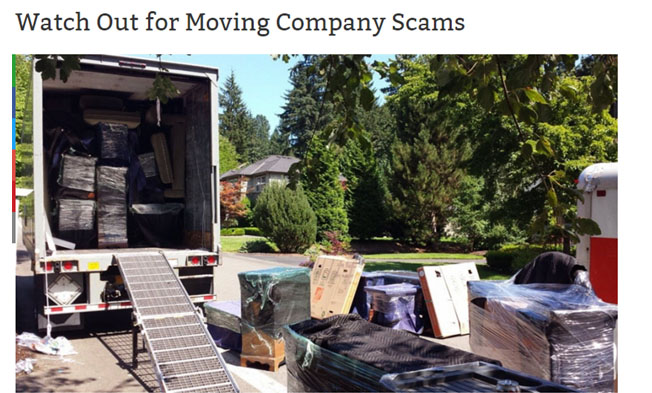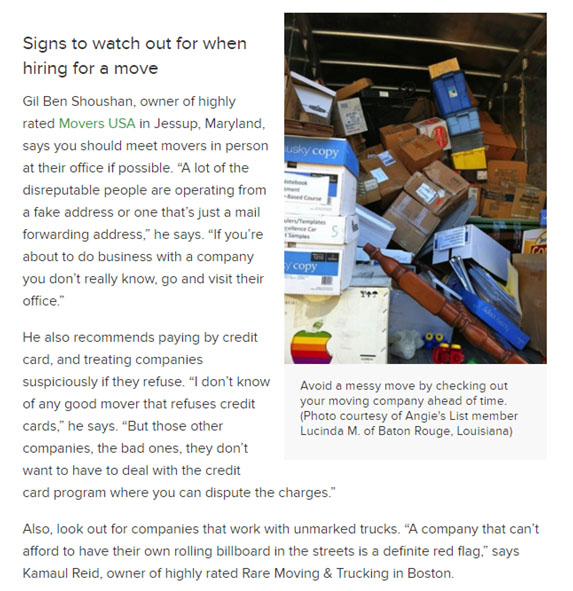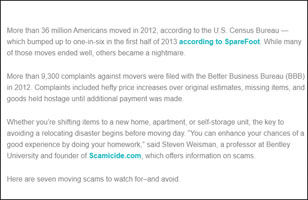Moving Scams
A moving scam is a trick by a moving organization in which the organization gives an appraisal, loads the goods, and then demands a much higher fee to deliver the items, effectively holding them as lien. There are numerous variations of moving scams, but the basic trick starts when a prospective customer contacts a moving company for an expense estimate. In today's market, this often happens online via moving registries, intermediaries, or phone calls. These moving brokers are sales representatives who sometimes quote low yet seemingly reasonable prices without allowing movers to provide quality service.
Moving scams involve deceptive practices by fraudulent moving companies, putting individuals at risk during relocations. Hostage load scams occur when movers demand additional fees before unloading possessions. Low-ball estimates attract customers with initially cheap pricing but result in unexpectedly higher charges later. Scammers may create fake reviews and credentials, making thorough research essential. Non-binding estimates can lead to unexpectedly high payments after loading. Unlicensed or uninsured movers risk inadequate protection for belongings. Hidden fees often catch customers off guard, significantly increasing overall costs. To safeguard against moving scams, individuals should thoroughly research moving companies, opt for in-home estimates, check licensing and insurance, scrutinize contracts, and seek recommendations. Awareness and caution are crucial to ensuring a secure and hassle-free moving experience.

We are providing the Spam Checker Tool for your convenience. Here, you can enter the email or contact number that you suspect to be a scam. This tool cross-checks the input with our spam database list and ensures whether the email or phone number is genuine or fraudulent.

If you are a victim of Ghana fraud, submit the scammer's details here. According to the U.S. Department of Transportation, more than 35 million moves take place every year. With such a large number of relocations involving moving companies, the risk of fraudulent moving companies infiltrating the process is high. Reports indicate that scammers target multiple industries, and moving is another area that opens doors for them to exploit unsuspecting individuals.
Not every moving company is legitimate. Many scam moving companies approach some of the 35 million movers each year, presenting themselves as trustworthy services while preying on families relocating from one home to another. To help individuals stay informed, we have compiled a list of reliable online scam-fighting agencies that provide updates on past and current moving scams.
While most moves occur without issues, there has been a steady rise in complaints filed against moving companies. Fraudulent movers deceive victims with unrealistic offers and later demand significantly higher payments, holding the merchandise hostage. Scam moving companies reach out through emails, phone calls, and moving registries, making it crucial for people to stay cautious.
Moving scams involve deceptive practices by unscrupulous moving companies, including hostage load scams, where movers demand extra fees before releasing possessions; low-ball estimates, which attract customers with cheap initial pricing but increase costs dramatically later; fake reviews and credentials, misleading customers into trusting fraudulent services; non-binding estimates, leading to unexpectedly high payments after loading; unlicensed or uninsured movers, posing significant risks to the safety of belongings; and hidden fees, catching customers off guard and increasing overall moving expenses.
To avoid moving scams, individuals should thoroughly research moving companies, opt for in-home estimates rather than online-only quotes, verify licensing and insurance credentials before hiring a company, carefully review contracts to understand pricing structures and terms, and seek recommendations from trusted sources. Being vigilant is key to ensuring a safe and hassle-free moving experience.
You can verify a list of legitimate moving companies, their profiles, ratings, and user reviews at www.moverrankings.com.
I've removed unnecessary breaks while maintaining clarity and readability. Let me know if you need any further refinements!
Common claims by moving scam companies:
The famous bait and switch moving scam claim:
The most common claim that moving scam companies make is the lowest price quotation that appears too good to be true to the user. The scam company then smartly raises the budget when it is too late for the mover to back out. Such a scam strategy is popularly known as the bait-and-switch scam strategy. The infamous bait-and-switch moving scam involves fraudulent moving companies initially providing a low-cost estimate to attract customers. Once the belongings are loaded, they switch the terms, presenting higher costs or additional fees that were not disclosed initially. This deceptive tactic preys on customers who were lured by the initial low estimate. To avoid falling victim to the bait-and-switch moving scam, individuals should thoroughly research moving companies, opt for in-home estimates, and carefully scrutinize all terms and conditions in the moving contract before making any commitments.
The hostage situation demand:
The Phantom delivery scam claim:
In such a claim, the moving company promises to deliver your belongings on a certain date. However, when that day arrives, there is no sign of the company, their claim, or your possessions—everything vanishes into thin air, leaving the user as a victim of a moving scam.
Moving is a tedious process, but that does not mean you should leave all the details in the hands of the moving company. You need to stay informed at every step while the responsibility of moving is entrusted to a company.
The best way to protect yourself from moving scams is to be well-informed about the moving company.
The "Phantom Delivery Scam" is a deceptive tactic used by fraudulent moving companies. In this scheme, after loading a customer's belongings onto the truck, the scammers simply disappear, never delivering the possessions to the intended destination. This leaves the customer in distress, as their valuables seem to vanish into thin air. The fraudulent movers typically become unreachable, making it nearly impossible for the victim to track down their possessions or seek compensation. This scam exploits the trust and vulnerability of individuals during a move, turning an exciting new chapter into a nightmare. To safeguard against such scams, individuals should thoroughly research and choose reputable moving companies, obtain written contracts, and establish clear lines of communication before entrusting their belongings to any mover.



Tips to know while moving:
-
No moving company should make users sign a blank contract. Always ask for written documents where every detail related to your move, including costs, delivery date, and conditions, is clearly outlined. Having everything in writing ensures you have a contractual safeguard in case any issues arise.
Check all your belongings once the move is successfully completed. You only have nine months to report any damages that occurred during the moving process.
It is always best to pay the moving company using a credit card. This method provides a record of the transaction, which can be used to verify the company's details in case of disputes or fraudulent activity.
Thoroughly research and verify the moving company before handing over the contract to them.
Follow up on every single step during the moving process. Even though a moving company is handling the relocation, staying actively involved ensures better oversight and minimizes risks.
Signs that help users know that a moving company is scam:
A moving company that provides an unseen estimate without assessing the moving locations is likely a scam. Legitimate companies conduct thorough evaluations of both the starting and destination points, basing their quotations on weight and quantity of belongings.
A moving company that rushes to close the deal without proper inquiry or verification raises suspicion.
Reputable moving companies usually accept payment upon delivery. Any company that insists on full payment before the move is often a warning sign.
Many scam moving companies operate under similar names as well-known, reliable movers. Always verify the company details before signing the contract.
Fraudulent movers often demand extra charges for packing, delivery, or other hidden fees. Ensure every cost is clarified upfront before proceeding.
Companies that insist on cash payments are questionable. A legitimate moving company should never deny a payment via credit card.
Many moving scams are occurring, with victims sharing their experiences online to raise awareness about fraudulent companies exploiting innocent customers.

Tips on judging a moving company:



